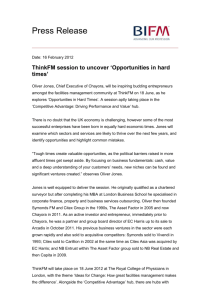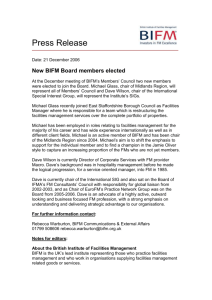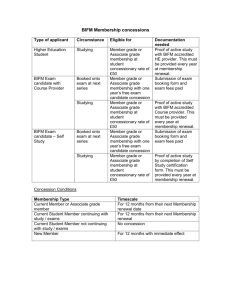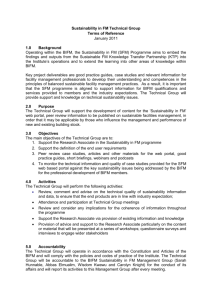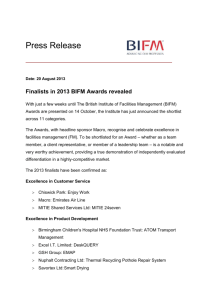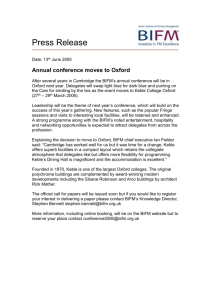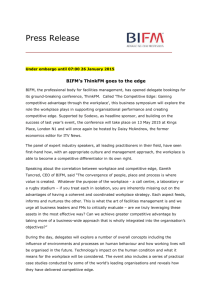Bribery Act 2010 The Bribery Act 2010 received Royal Assent on 8
advertisement
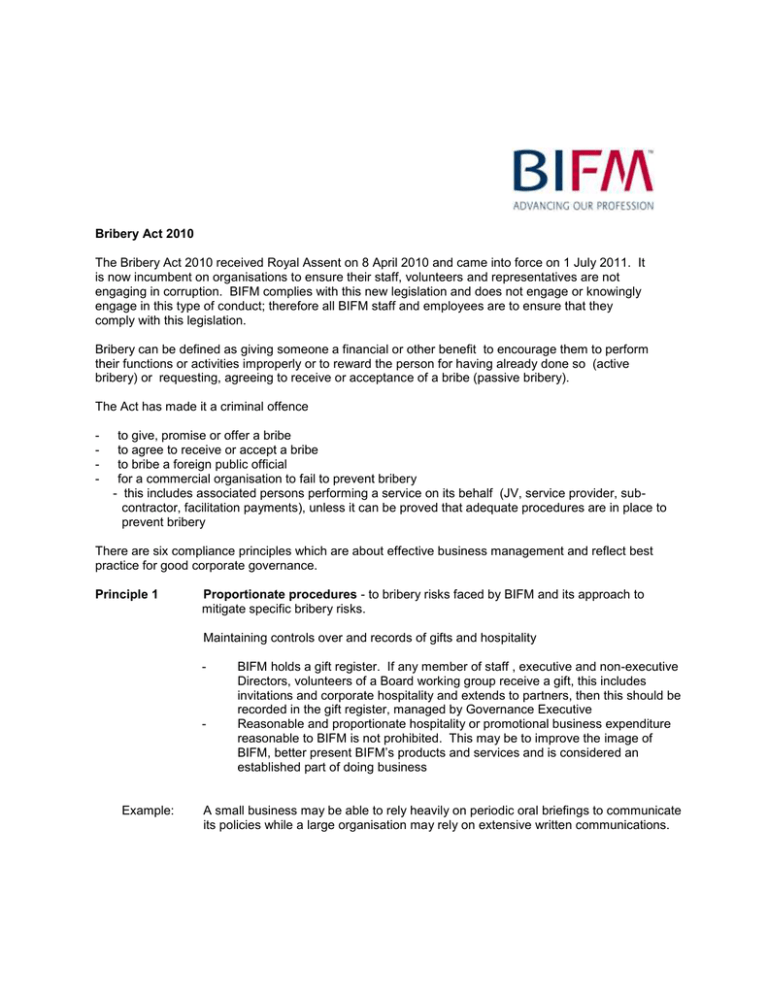
Bribery Act 2010 The Bribery Act 2010 received Royal Assent on 8 April 2010 and came into force on 1 July 2011. It is now incumbent on organisations to ensure their staff, volunteers and representatives are not engaging in corruption. BIFM complies with this new legislation and does not engage or knowingly engage in this type of conduct; therefore all BIFM staff and employees are to ensure that they comply with this legislation. Bribery can be defined as giving someone a financial or other benefit to encourage them to perform their functions or activities improperly or to reward the person for having already done so (active bribery) or requesting, agreeing to receive or acceptance of a bribe (passive bribery). The Act has made it a criminal offence - to give, promise or offer a bribe to agree to receive or accept a bribe to bribe a foreign public official for a commercial organisation to fail to prevent bribery - this includes associated persons performing a service on its behalf (JV, service provider, subcontractor, facilitation payments), unless it can be proved that adequate procedures are in place to prevent bribery There are six compliance principles which are about effective business management and reflect best practice for good corporate governance. Principle 1 Proportionate procedures - to bribery risks faced by BIFM and its approach to mitigate specific bribery risks. Maintaining controls over and records of gifts and hospitality - - Example: BIFM holds a gift register. If any member of staff , executive and non-executive Directors, volunteers of a Board working group receive a gift, this includes invitations and corporate hospitality and extends to partners, then this should be recorded in the gift register, managed by Governance Executive Reasonable and proportionate hospitality or promotional business expenditure reasonable to BIFM is not prohibited. This may be to improve the image of BIFM, better present BIFM’s products and services and is considered an established part of doing business A small business may be able to rely heavily on periodic oral briefings to communicate its policies while a large organisation may rely on extensive written communications. Table: Authorisation Limits for giving/receiving gifts Presenting a gift including invitations and hospitality (includes partner) Receiving a gift including invitations and hospitality (includes partner) < £50 Staff £50 - £200 Head of £200 - £1,000 Executive > £1,000 Board Staff Head of Executive Board Principle 2 Top-level Commitment - a commitment from the Executive to carry out BIFM’s business fairly, honestly and openly, includes effective leadership in bribery prevention. BIFM has a Code of Conduct which it adheres too. Principle 3 Risk Assessment - this can be carried out using BIFM’s business objectives. There are five external risk groups; country risk, sectorial risk, transaction risk, business opportunity risk, business partnership risk. Principle 4 Due Diligence – Know who you are dealing with to help protect the organisation. This should be undertaken on persons who will perform a service on behalf of BIFM but should be undertaken as part of a wider due diligence framework. This is not applicable to people supplying goods to BIFM e.g. stationery. Maintaining controls over and records of other voluntary payments (charitable contributions and political contributions Example: Principle 5 The appropriate level of due diligence required for a commercial company contracting for the performance of information technology services will be low to reflect the low risks of bribery on its behalf. In contrast a company selecting an intermediary to assist in establishing business in foreign markets will require a higher level of due diligence to mitigate the risk of bribery on its behalf. Communication of policies, including training – BIFM’s anti-bribery stance. The internal communications “tone from the top” can focus on policies and procedures in areas such as decision making, financial control, hospitality and promotional expenditure, facilitation payments, charitable and political donations and the penalties for breaching rules and articulation of management roles at different levels. This should also be communicated externally to JV and people performing a service for the BIFM. There must also be secure, confidential and accessible means for the reporting of bribery, and BIFM has a “speak up” or “whistle blowing” procedure in place. BIFM’s Whistle Blowing Policy can be found in the staff handbook and in the Board Regulations which can be found on the website. Some training is required to educate and make staff aware of the threats posed by bribery to BIFM. This should also take into account the monitoring of staff who raise the issue surrounding data-protection and employee privacy. Staff who regularly attend or organise events should be given guidance. Principle 6 Example: Monitoring and Review BIFM will continually monitor, evaluate and review its processes, procedures and standards to ensure these are being complied with and kept up-to-date with the changing environment in which it operates. Review of good and bad practices in trade body publications. The above principles do not stand alone and there may be a combination of interrelated principles relevant to the BIFM policies and procedures. BIFM is also required to show evidence that policies and procedures are in place and staff are being training correctly within their business area. The BIFM Board will undergo anti-bribery training as part of the Strategic Away Day and will be asked to sign a copy of this policy to ensure they endorse the principles. The penalties given by the Act for bribery by an individual is 10 years imprisonment. A company convicted of failing to prevent bribery could receive an unlimited fine. NAME: ………………………………………………………… PRINT NAME: ……………………………………………….. DATE: ………………………………………………………….

